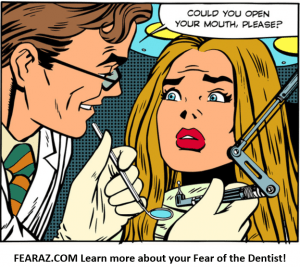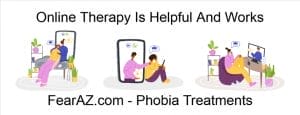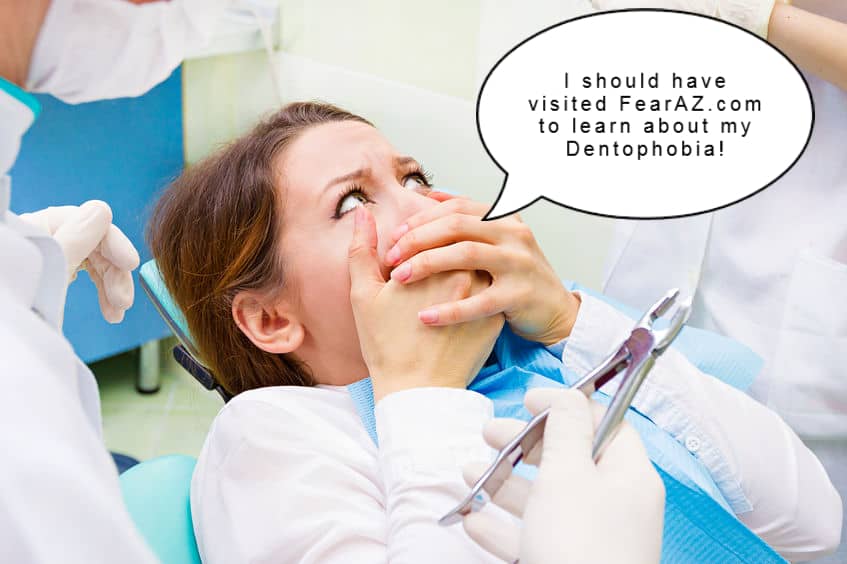Share This Article
Dentophobia, Anti-Dentites, and a Fear of the Dentist
Are you an anti-dentite? The phrase, from the long-running television series Seinfeld, was coined to describe people who hate dentists. While Jerry and Kramer were riffing on real-life bigotry (as well as a certain dentist who’s fixated on making as many cultural jokes as possible), some people really do hate dental visits. Sure, they may admit that dentists are just people like everybody else, but even so, the thought of visiting the dentist for a filling fills them with anxiety.
While you may not be an anti-dentite (come now, do you really think dentists are so different from me and you?), does your fear of the dentist rise to the level of a phobia?
Let’s sink our teeth into the fear of going to the dentist, its causes and effects, and let’s find out if you can overcome those anti-dentite inclinations and emerge from the dental office with a smile on your face.

What Is Dentophobia?
For as fun as the anti-dentite shtick may be for us Seinfeld fans, the real name for a fear of the dentist is dentophobia. For all the joking on Seinfeld, dentophobia is relatively common compared to other phobias, and can have surprisingly serious results.
For one thing, your fear of the dentist may be part of iatrophobia, which is a fear of doctors, or trypanophobia, which is a fear of needles.
According to WebMD, fear of dentists “prevents millions of Americans” from getting dental care—and that can involve a lot more than less than perfect teeth. Your dental and oral hygiene are connected with other elements of your well-being. For example, unchecked gum disease has been linked to increased risk for diabetes, heart disease, and strokes.
WebDMD also notes that “between 5 and 8 percent of Americans” are afraid of the dentist, but obviously that can vary. There is a big difference between just not liking the dentist or being worried that a cavity will hurt versus experiencing the kind of pathological fear that can grip those with dentophobia.
WebMD takes that data from Peter Milgrom, a dentist who is the director of the Dental Fears Research Clinic, which is headquartered in Seattle. By Milgrom’s estimate, as many as 20 percent, while not technically experiencing a phobia, have such an aversion to dentists they only visit “when absolutely necessary.”
Common Causes of Dentophobia
Milgrom does a good job of drilling down into the different reasons why dentophobia exists (your answer to the inevitable question “what is fear of dentists called?”).
These reasons are more varied and complex than you might expect. Sure, it is understandable why you might be afraid of a cavity or gingivitis, but the roots of dentophobia are a lot deeper than that.
Of the patients Milgrom’s organization treats, two thirds have had prior bad experiences with the dentist, which you could probably guess for yourself.
More shocking is that one third reported fear of the dentist due to prior unrelated traumas, including substance abuse, domestic violence, and childhood sexual violence or abuse.

If your dentophobia stems from one or more of those triggers, you obviously have a far larger issue to tackle, and the above US links can help you (if you’re a reader from the UK or Canada, they have similar organizations).
As you might guess, dentophobia is not a phobia listed in the DSM-5, but is rather a social phobia, which is the term for phobias triggered by social events and incidents in our lives. That may be one reason why different forms of dentophobia are not only more widespread than you might imagine, but also exist in so many varieties.
Symptoms of Social Phobias Such As Dentophobia
Common symptoms of social phobias which may be pertinent to dentophobia include the following:
● Elevated heartbeat
● Shaking and sweating
● Upset stomach
● Lightheadedness
● Shortness of breath
● Feeling like your mind is blank because you’re focusing so much on the phobia
● Muscle tension
Self-Help Treatments for Fear of the Dentist
None of those symptoms paint a picture of dentophobia worth smiling about, so what can be done about it?
Let’s start with the self-help side.
One of the most important things to do when confronting your fear of the dentist is to ask yourself why you fear them, if it’s really them you fear or one of the other aforementioned issues, and go from there. Coping with a phobia often isn’t a one-off solution but rather a branching one. One answer begets another question, and it is that question/answer dichotomy that leads you to the solutions which produce true and lasting help and healing.
In keeping with that, one of the best self-help strategies for dealing with dentophobia is practicing mindfulness and meditation. This can be a great way to refocus your energy and thoughts in a positive manner.
With mindfulness, you can refocus your thoughts on the cause of the phobia, and in so doing come to a rational answer as to why you have it and how you can beat it.
With meditation, the exact opposite is preferable. Rather than focusing on your phobia, you want to focus your thoughts and feelings away from that into a more peaceful place, allowing you to achieve a sense of inner calm, which in turn can help you calm, quell, and ultimately conquer your inner demons, dentophobia included.
You might want to try some deep breathing exercises, too. Take a deep breath, hold it for a few seconds, and let it out slowly. This is a versatile calming technique, and it can help you calm your nerves before seeing the dentist.

Professional Treatment for Fear of the Dentist or Dentophobia
Let’s say that your dentophobia is more serious than that and you need professional help.
To that end, let’s actually start with the last place you might expect: the dentist themselves. Part of doctors’ training involves bedside manner, and dentists are no exception. It isn’t hard to understand why people might feel a little uncomfortable and anxious about someone sticking sharp metal tools into their mouth.
Good dentists understand that, which is why they’re less like Steve Martin’s sadistic dentist out of Little Shop of Horrors and more like someone who loves their patients—so tell them if you’re nervous! Your dentist can work with you to make sure that your personal anxieties are addressed and you feel as comfortable as possible during your appointment.
In terms of other techniques for overcoming a fear of the dentist, you might want to consider seeing a therapist. This is especially true if your fear of the dentist stems from violence or abuse as mentioned above.
Professionals can help treat you with methods such as Cognitive Behavioral Therapy (CBT), which works to rewire the way your brain thinks about certain things. Don’t think about dentistry as meaning sharp tools and drills, but rather white teeth and happy smiles.
If your anxiety is severe enough or the pain (or fear thereof) is severe enough, you might want to ask your dentist about medication. Anesthesia as well as mild sedatives or other treatments can be available, although you obviously want to be careful about overuse.
Dealing with any fear can be difficult, but especially one as simple yet complex as a fear of the dentist. On the one hand, admitting that you’re afraid of the dentist can be embarrassing. On the other hand, the causes of dentophobia are quite varied, as are the solutions.
So don’t be an anti-dentite! If you suffer from dentophobia, keep trying to find a solution, and you’re sure to be left smiling in the end.



